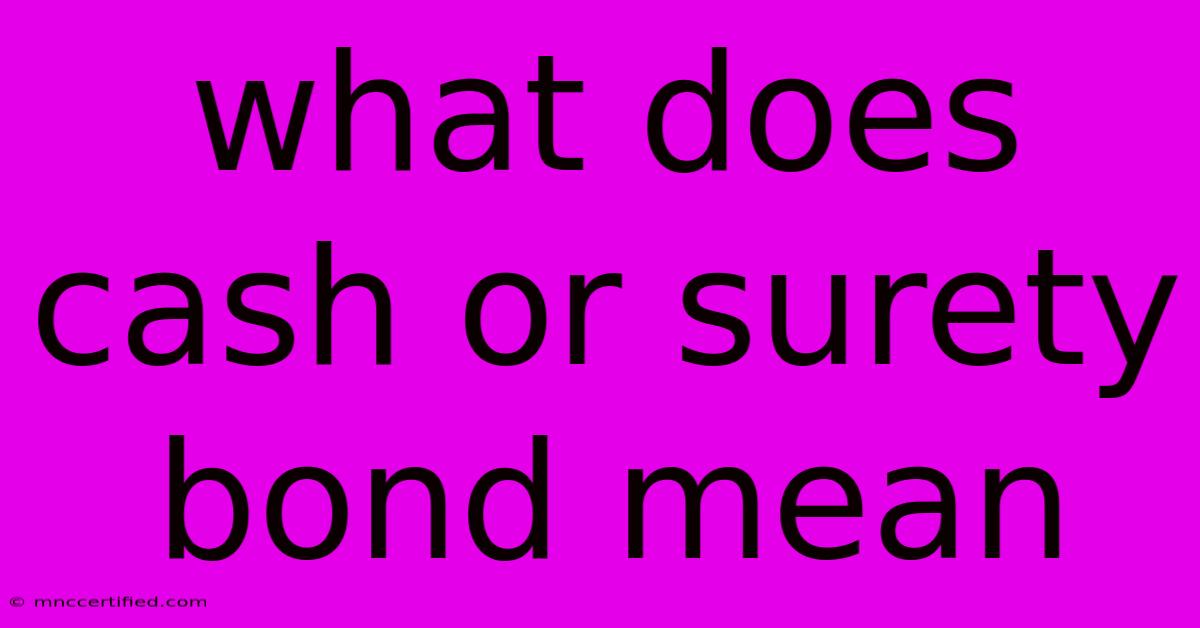What Does Cash Or Surety Bond Mean

Table of Contents
What Does a Cash or Surety Bond Mean? Understanding Your Options
A cash or surety bond might sound intimidating, but understanding their purpose and differences is crucial in various situations, from construction projects to legal proceedings. This comprehensive guide will break down what each type of bond entails, their benefits, drawbacks, and when you might need one.
What is a Surety Bond?
A surety bond is a three-party agreement involving:
- The Principal: The individual or entity required to obtain the bond. They are the ones legally obligated to fulfill the terms outlined in the bond.
- The Obligee: The party who benefits from the bond, receiving compensation if the principal fails to meet their obligations. This could be a government agency, a client, or another party.
- The Surety: The insurance company or bonding agency guaranteeing the principal's performance. They will pay the obligee if the principal defaults.
Think of the surety as a guarantor. They assess the principal's risk and provide financial backing, ensuring the obligee is protected. The surety does not typically lend money directly; instead, they guarantee the principal's performance.
Types of Surety Bonds
Surety bonds come in various forms, each designed for a specific purpose. Common examples include:
- Contract Bonds: Used in construction projects to ensure the contractor completes the work as agreed upon. This includes bid bonds, performance bonds, and payment bonds.
- Fidelity Bonds: Protect against employee dishonesty and theft.
- License and Permit Bonds: Required for various licenses and permits, ensuring compliance with regulations.
- Court Bonds: Used in legal proceedings, such as bail bonds or appeal bonds.
Key Benefit: Surety bonds protect the obligee from financial loss if the principal fails to meet their commitments.
Key Drawback: Obtaining a surety bond often requires a credit check and demonstrating financial stability. The cost, or premium, is based on the principal's risk profile.
What is a Cash Bond?
A cash bond is a simpler arrangement where the principal deposits a specific amount of cash as collateral. This cash acts as a guarantee that the principal will fulfill their obligations. If the principal meets their obligations, the cash is returned. If they fail, the obligee keeps the cash.
Key Benefit: Cash bonds are straightforward and typically easier to obtain than surety bonds, especially for smaller amounts.
Key Drawback: Tying up a significant amount of cash can severely impact liquidity. The entire amount is at risk if the principal fails to meet their obligations.
Cash Bond vs. Surety Bond: A Comparison
| Feature | Cash Bond | Surety Bond |
|---|---|---|
| Collateral | Cash deposit | Surety company's guarantee |
| Cost | Full amount of the bond | Premium (percentage of the bond amount) |
| Liquidity | Ties up significant cash | Preserves cash liquidity |
| Risk | High risk to the principal | Lower risk to the principal |
| Obtaining | Generally easier to obtain | Requires credit check and financial review |
| Complexity | Simpler process | More complex process |
When Might You Need a Bond?
Numerous situations require either a cash or surety bond. Some common examples include:
- Construction Projects: Contractors often need bonds to guarantee project completion and payment to subcontractors.
- Licensing and Permits: Various professions and businesses require bonds to ensure compliance with regulations.
- Legal Proceedings: Court bonds are used in various legal contexts, ensuring appearance in court or fulfilling financial judgments.
- Immigration: In certain cases, immigration bonds are required to ensure an individual's presence during immigration proceedings.
Choosing Between Cash and Surety Bonds
The best choice depends on individual circumstances and risk tolerance. If liquidity is a concern and the principal has a good credit history, a surety bond is usually preferred. Cash bonds are more suitable for smaller amounts where obtaining a surety bond might be challenging or impractical. Always consult with a financial professional or legal expert to determine the most appropriate option for your specific situation.
Remember to thoroughly research the requirements and implications of each bond type before committing. Understanding the nuances of cash and surety bonds empowers you to make informed decisions and protect your financial interests.

Thank you for visiting our website wich cover about What Does Cash Or Surety Bond Mean. We hope the information provided has been useful to you. Feel free to contact us if you have any questions or need further assistance. See you next time and dont miss to bookmark.
Featured Posts
-
Pokemon Unbroken Bonds Booster Box
Nov 15, 2024
-
Trump Selects Rfk Jr A Background Check
Nov 15, 2024
-
Review Cross Almost Gets Patterson Right
Nov 15, 2024
-
Taylor Swift And Fall Viruses Stay Healthy
Nov 15, 2024
-
Infowars Sold Onion Wins Bid
Nov 15, 2024